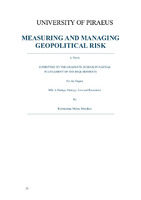| dc.description.abstractEN | In light of the changing geopolitical situation and the emergence of new risks, it is crucial for decision makers to actively detect and tackle possible threats to the system. Regularly monitoring, evaluating, and enhancing risk management procedures is crucial to guarantee the system's ability to withstand and endure geopolitical crises. To understand how to measure and manage geopolitical risk, it is first necessary to define the control elements of the system that we want to control if and how it is affected. For this particular process, we should have a detailed and in-depth understanding of how the system works, its
vulnerabilities and strengths. With an in-depth examination of the complexities of the system, decision makers can get a deep understanding of its functioning and identify potential dangers that could jeopardize its stability. Next, we need to classify and assess the potential Geopolitical risks that could impact our system, employing the methodology that we deem most likely to yield accurate outcomes. This involves examining variables such as political and economic volatility, societal turmoil, and ecological hazards. Various techniques, such asscenario analysis or risk tables, can be employed to evaluate the probability and consequences of various risks. The subsequent phase entails addressing significant risks that may impede the seamless operation of our system, implementing strategies to either prevent geopolitical threats or, if prevention is not feasible, minimize their impact. After identifying potential risks, strategies should be designed by implementing preventive measures, hedging
risks or even exiting high-risk areas or markets. Finally, the feedback process is required where it is checked whether the measures taken worked and whether the geopolitical risks did not affect or affected our system at tolerable levels. If we do not have the desired results, we repeat the process from the beginning or from the point where the deviation was observed.
Managing geopolitical risk is an ongoing process that requires constant vigilance and adaptation. The thesis following this systematic approach, proposes processes that can measure, and effectively manage, geopolitical risks in an increasingly complex and interconnected world. | el |



